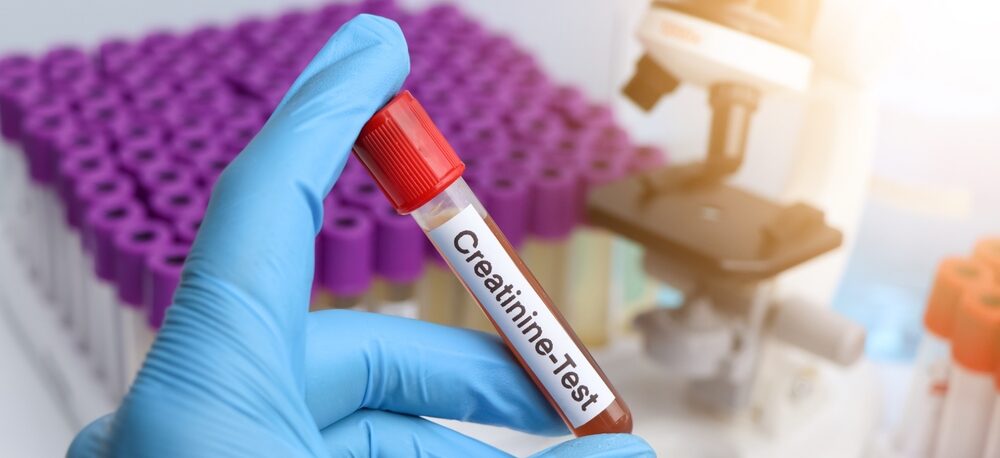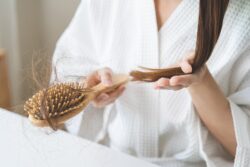
Does Creatine Cause Hair Loss?
Creatine is one of the most popular fitness supplements available. People use it to boost energy, build muscle, and improve their performance in the gym. Whether you’re trying to bulk up or work on your endurance, creatine is a go-to for many fitness lovers.
But there’s one question that keeps popping up: Does creatine cause hair loss ? This concern usually comes from rumors about its potential effect on hormones like DHT, which is linked to hair thinning.
In this blog, we’re going to look at what the science says about creatine and hair loss, sort out the facts from the myths, and help you decide if this supplement is worth worrying about when it comes to your hair. Let’s dive in!
What Is Creatine?
Creatine is something your body naturally makes, and it’s mostly found in your muscles and brain. You also get small amounts from foods like red meat and fish. But if you’re looking to improve your workouts, many people turn to creatine supplements for a boost.
Here’s how it works: creatine helps your muscles produce more energy, especially during quick, intense activities like lifting weights or sprinting. It does this by increasing the amount of adenosine triphosphate (ATP), the primary energy source for your muscles. With more ATP, your muscles can work harder, helping you get stronger, push longer, and recover faster. That’s why it’s a go-to for athletes, bodybuilders, and anyone serious about fitness.
When it comes to supplements, creatine monohydrate is the most popular choice because it’s affordable and proven to work. There are other types, like creatine hydrochloride (HCL) and creatine ethyl ester, but most people stick to monohydrate for its simplicity and effectiveness.
Whether you’re new to creatine or have been using it for a while, understanding what it does can help you decide if it’s the right fit for your fitness routine.

Understanding Hair Loss
Hair loss is something many people deal with, and it can happen for various reasons. While losing a few hairs each day is normal, noticing more hair loss than usual can be concerning.
Here are some common causes:
- Genetics: Family history is the most common cause of hair loss. If your parents or grandparents experienced thinning hair, there’s a good chance you might too.
- Hormonal Changes: Hormones play a big role in hair health. Changes like pregnancy, menopause, or thyroid problems can all contribute to hair loss.
- Stress: Both emotional and physical stress can cause your hair to fall out. Stress can push your hair into a shedding phase, making hair loss more noticeable.
- Nutrition: A poor diet lacking important vitamins and minerals can affect how your hair grows. Vitamin deficiencies, particularly in iron, vitamin D, and biotin, can lead to hair thinning and loss. Eating a balanced diet is key to keeping your hair strong and healthy.
One hormone often linked to hair loss is dihydrotestosterone (DHT), which comes from testosterone. DHT can shrink hair follicles, making hair thinner and leading to hair loss, especially for those with a family history of hair thinning.
There are also several myths about hair loss. For example, some people think washing their hair too often or wearing tight hats causes it. While wearing tight hats can create tension on your hair and lead to breakage, regular hair care habits don’t typically cause permanent hair loss. Tight hairstyles, like ponytails, can also stress the hair, but everyday grooming usually isn’t the culprit.
Understanding these factors can help you better recognize the causes of hair loss and avoid falling for common myths.
The Science Behind Creatine and Hair Loss
The connection between creatine and hair loss often comes up because of a study from 2009 by researchers at the University of Stirling in Scotland. This study is often mentioned when people question whether creatine could cause hair loss.
In the study, college-aged male rugby players took creatine for three weeks. The results showed that their DHT (dihydrotestosterone) levels, a hormone linked to hair loss, increased by two to three times.
So what does this mean? DHT is a hormone that can shrink hair follicles, especially in people who are genetically more likely to lose hair. Higher DHT levels are often connected to thinning hair, especially on the scalp. This led some to wonder if creatine might cause hair loss by increasing DHT levels.
But does creatine really cause hair loss? Not exactly. While the 2009 study found that creatine raised DHT levels, it didn’t prove that creatine directly causes hair loss. The study only looked at DHT in a small group of men for a short time. Plus, not everyone with higher DHT will lose hair, as genetics play a big role.
Other research on creatine and hair loss shows mixed results. Some studies suggest creatine may raise DHT, but others don’t find a strong link between creatine and noticeable hair loss. The connection between creatine and DHT isn’t strong enough to say it definitely causes thinning hair.
Also, twelve studies have looked at how creatine affects testosterone levels. Two of them found small increases in testosterone, but these changes weren’t significant. The other ten studies found no change in testosterone levels.
In the end, while creatine may raise DHT levels, more research is needed to determine whether it causes hair loss for everyone.
Does Creatine Cause Hair Loss? Myths vs. Facts
There are a lot of myths about creatine and its link to hair loss, so let’s break it down and clear up the confusion.
Myth 1: Creatine always causes hair loss
One of the biggest myths is that creatine automatically leads to hair thinning. While some research shows creatine may increase DHT levels (a hormone tied to hair loss), there’s no solid evidence that it causes hair loss for everyone. Hair loss is influenced by many things, and creatine might only be one small factor.
Myth 2: Creatine causes permanent hair loss
Another myth is that creatine will permanently damage your hair. That’s not true. Even if creatine raises DHT levels, the effect on hair loss is probably temporary, and it all depends on your genetics. If you’re not genetically prone to hair loss, you might not notice any difference at all.
Myth 3: Taking more creatine will make hair loss worse
Some people believe that the more creatine you take, the more hair loss you’ll have. But there’s no proof of this. The studies that have been done focused on short-term creatine use, and there’s no evidence that long-term use leads to thinning hair.
The Facts
- No clear evidence: While some studies suggest creatine can increase DHT levels, there’s no strong evidence that this actually causes noticeable hair loss for most people. We still don’t fully understand how creatine affects hair growth, and more research is needed.
- Genetics play a big role: If you have a family history of hair loss, or if you’re genetically prone to male or female pattern baldness, you’re more likely to experience hair thinning, regardless of creatine. DHT might contribute, but your genetics are the main factor.
- Other factors matter too: Things like your diet, stress levels, overall health, and hair care habits all play a role in hair loss. If you’re using creatine but not eating well or managing stress, those things could be more important for hair thinning than creatine itself.
In the end, while creatine may raise DHT levels in some people, it doesn’t automatically lead to hair loss. If you’re worried about it, it’s a good idea to keep an eye on your hair health and talk to a doctor before you start or continue using creatine.
Tips for Using Creatine Safely
If you’re considering creatine but worried about hair loss, here are some simple tips to use it safely:
-
Talk to your doctor first
Before using creatine, check with your healthcare provider, especially if you have concerns about hair loss. They can help you decide if it’s right for you and recommend the right dosage.
-
Eat well and stay healthy
A balanced diet with vitamins like biotin, zinc, and vitamins A, C, and D supports hair health. Also, manage stress, drink enough water, and get enough sleep to keep your hair strong. Creatine should complement a healthy lifestyle.
-
Monitor your hair
If you notice changes in your hair, like thinning or texture changes, consider reducing or stopping creatine. Also, look at other factors like stress or diet that might be affecting your hair.
-
Try other supplements
If you’re still worried, consider alternatives like BCAAs, beta-alanine, or L-carnitine. These can help with muscle recovery and performance without the same concerns about hair loss.
By following these tips, you can use creatine safely while keeping an eye on your hair and overall health.
Side Effects of Creatine
Creatine is generally safe for most people, but it’s helpful to be aware of potential side effects. Not everyone will experience them, but here are some of the common ones:
-
Water Retention
Creatine can cause your muscles to hold more water, which might make them appear larger and feel a little swollen. This is usually temporary and harmless, but it can lead to a small weight gain and a feeling of bloating.
-
Digestive Issues
Some people may experience stomach issues, like cramps, bloating, diarrhea, or nausea. This can often be avoided by taking smaller doses of creatine throughout the day, rather than one large dose. You might also find that taking creatine with food helps reduce any stomach discomfort.
-
Muscle Cramps or Strains
In rare cases, creatine can cause muscle cramps or strains. This could happen because the extra water in your muscles can affect your body’s electrolyte balance. Staying hydrated and making sure your electrolytes are in check can help minimize this risk.
-
Kidney Stress (Rare)
Although creatine is safe for most healthy people, it can put extra strain on your kidneys, especially if you already have kidney issues. If you have any concerns about your kidneys, it’s a good idea to talk to a doctor before using creatine.
-
Dehydration
Since creatine pulls water into your muscles, it’s important to drink plenty of water to avoid dehydration. If you’re not drinking enough, you could feel tired, dizzy, or experience a dry mouth, especially if you’re doing intense exercise while on creatine.
Most of these side effects are mild and can be managed with proper hydration, dosing, and diet. But if you experience more serious symptoms, like severe discomfort, swelling, or changes in kidney function, it’s important to stop using creatine and talk to a doctor.
Who Should Avoid Creatine?
Creatine is safe for most people, but some groups may want to avoid or limit its use due to health concerns. Here’s who should be cautious:
-
People with a family history of hair loss
If hair loss runs in your family, especially pattern baldness, creatine might increase DHT levels, which could worsen hair thinning. It’s best to consult a doctor if you’re concerned.
-
Those with existing hair loss or scalp issues
If you’re already dealing with hair thinning or scalp problems, creatine might make it worse. It’s better to focus on improving scalp and hair health first.
-
People with hormonal imbalances
Creatine can affect hormone levels, which could be problematic for people with thyroid issues or PCOS. Talk to your doctor if you’re worried about how creatine might interact with your condition.
If any of these apply to you, talk to a healthcare professional before using creatine to ensure it’s the right choice for your health.

Is Creatine Right for You and Your Hair?
The connection between creatine and hair loss isn’t as straightforward as it may seem. Some studies suggest that creatine could increase DHT levels, which are linked to hair loss, but there’s no clear evidence showing that creatine directly causes hair thinning for everyone. Genetics, lifestyle, and overall health play a much bigger role in hair loss than creatine alone.
If you’re concerned about hair loss but want to enjoy the benefits of creatine, it might be a good idea to talk to a healthcare professional. A balanced diet and keeping track of your hair health can also help. If creatine doesn’t seem to work for you, there are plenty of other supplements that can support your fitness goals without the same worries.
Ultimately, it’s all about finding what works best for your body and your health. With a little attention and care, you can make an informed decision about whether creatine is right for you.
